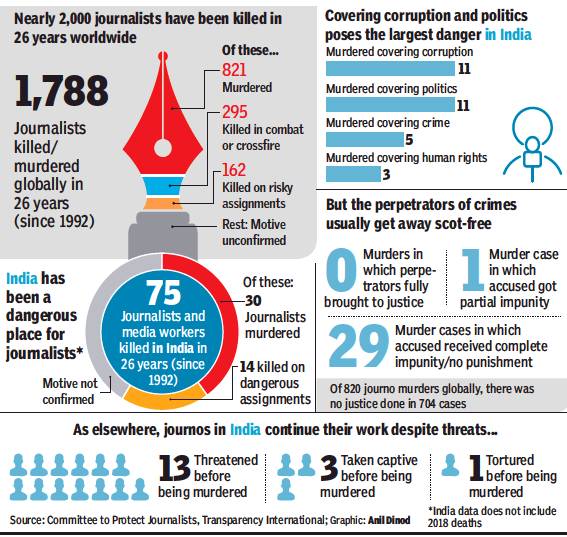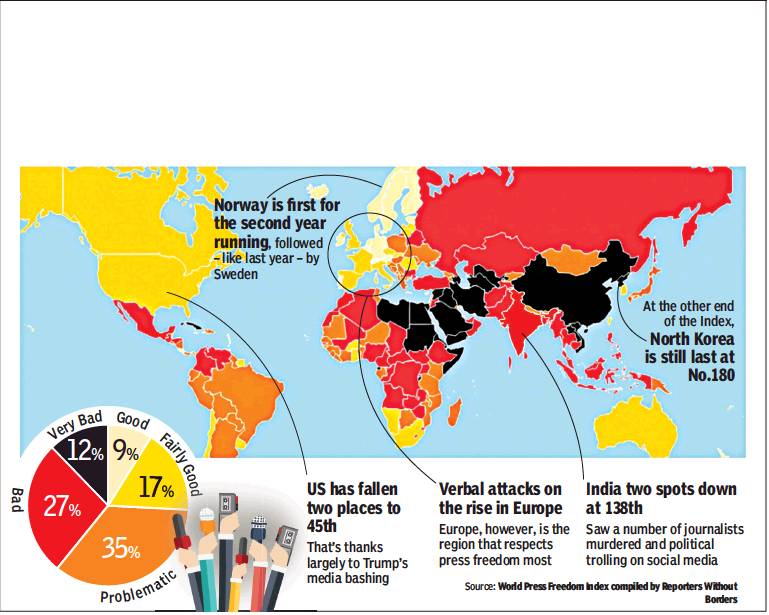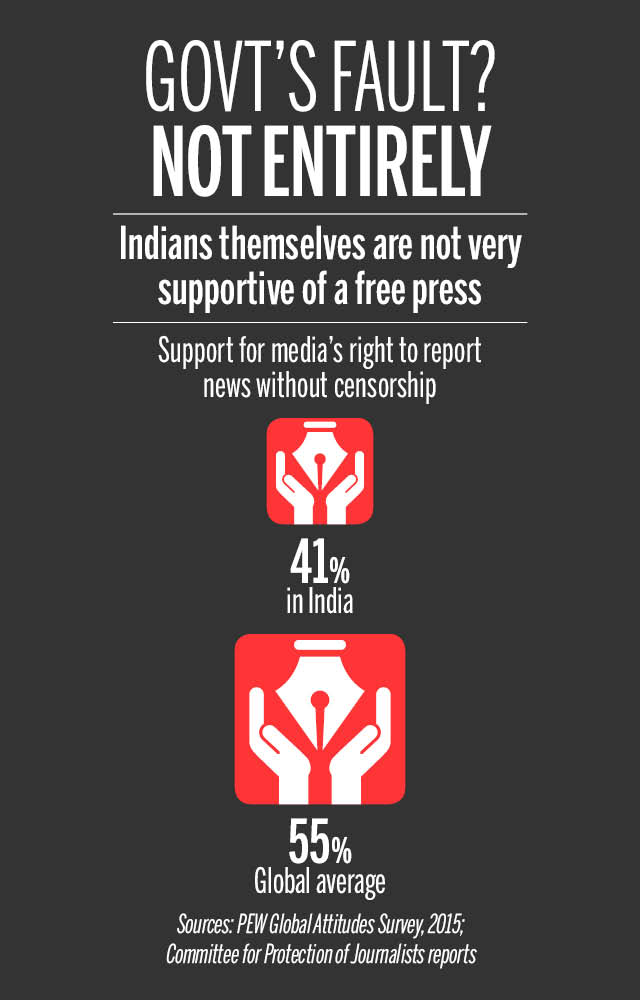Freedom of the press/ media, safety of journalists: India
(→2018: World Press Freedom Index) |
|||
| Line 6: | Line 6: | ||
|} | |} | ||
| − | [ | + | |
| − | + | ||
| − | + | ||
| − | + | ||
| − | + | ||
| − | + | ||
| − | + | =Court judgements= | |
| + | ==SC’s 6 rules to guard Press freedom/ 2020== | ||
| + | [https://epaper.timesgroup.com/Olive/ODN/TimesOfIndia/shared/ShowArticle.aspx?doc=TOIDEL%2F2020%2F04%2F25&entity=Ar00807&sk=B554D3E7&mode=text Dhananjay Mahapatra, SC lays down 6 rules to guard Press freedom, April 25, 2020: ''The Times of India''] | ||
| + | |||
| + | The Supreme Court outlined six cardinal principles to protect journalistic freedom guaranteed under Article 19 and said criminal process should not assume a vexatious character by filing of FIRs for the same cause in many states. | ||
| + | |||
| + | Hearing a case involving a TV anchor, a bench of Justices D Y Chandrachud and M R Shah allowed investigation into one FIR in Mumbai against the anchor while simultaneously staying proceedings in similar FIRs lodged by Congress activists. The bench also stayed proceedings in all FIRs for three weeks to permit the anchor to seek anticipatory bail. | ||
| + | |||
| + | The bench also said no investigation in any FIR except the one lodged in Nagpur, which has been ordered to be transferred to Mumbai, or any future FIR will be proceeded with.After hearing senior advocates Mukul Rohatgi for the anchor and senior advocates Kapil Sibal for Maharashtra, Vivek Tankha for Chhattisgarh and Manish Singhvi for Rajasthan, the Justice Chandrachud-led bench said a balancing of six principles was required to ensure fair administration of criminal justice. The principles are: | ||
| + | |||
| + | • Need to ensure that criminal process does not assume the character of a vexatious exercise by institution of multifarious complaints founded on the same cause in multiple states | ||
| + | |||
| + | • Need for the law to protect journalistic freedom within the ambit of Article 19(1)(a) of the Constitution | ||
| + | |||
| + | • Requirement that recourse be taken to remedies available to every citizen in accordance with the Code of Criminal Procedure, 1973 | ||
| + | |||
| + | • Ensuring that in order to enable the citizen to pursue legal remedies, a protection of personal liberty against coercive steps be granted for a limited duration | ||
| + | |||
| + | • Investigation of an FIR should be allowed to take place in accordance with law without SC deploying its jurisdiction under Article 32 to obstruct due process of law | ||
| + | |||
| + | • Assuaging the apprehension of the petitioner of a threat to his safety and the safety of his business establishment. | ||
=Safety of Journalists = | =Safety of Journalists = | ||
| Line 101: | Line 121: | ||
[[Sedition and the law: India]] | [[Sedition and the law: India]] | ||
| + | |||
| + | [[Category:Afghanistan|F | ||
| + | FREEDOM OF THE PRESS/ MEDIA, SAFETY OF JOURNALISTS: INDIA]] | ||
| + | [[Category:Bhutan|F | ||
| + | FREEDOM OF THE PRESS/ MEDIA, SAFETY OF JOURNALISTS: INDIA]] | ||
| + | [[Category:China|F | ||
| + | FREEDOM OF THE PRESS/ MEDIA, SAFETY OF JOURNALISTS: INDIA]] | ||
| + | [[Category:India|F | ||
| + | FREEDOM OF THE PRESS/ MEDIA, SAFETY OF JOURNALISTS: INDIA]] | ||
| + | [[Category:Law,Constitution,Judiciary|F | ||
| + | FREEDOM OF THE PRESS/ MEDIA, SAFETY OF JOURNALISTS: INDIA]] | ||
| + | [[Category:Nepal|F | ||
| + | FREEDOM OF THE PRESS/ MEDIA, SAFETY OF JOURNALISTS: INDIA]] | ||
| + | [[Category:Pakistan|F | ||
| + | FREEDOM OF THE PRESS/ MEDIA, SAFETY OF JOURNALISTS: INDIA]] | ||
Revision as of 12:26, 9 October 2020
This is a collection of articles archived for the excellence of their content. |
Contents |
Court judgements
SC’s 6 rules to guard Press freedom/ 2020
Dhananjay Mahapatra, SC lays down 6 rules to guard Press freedom, April 25, 2020: The Times of India
The Supreme Court outlined six cardinal principles to protect journalistic freedom guaranteed under Article 19 and said criminal process should not assume a vexatious character by filing of FIRs for the same cause in many states.
Hearing a case involving a TV anchor, a bench of Justices D Y Chandrachud and M R Shah allowed investigation into one FIR in Mumbai against the anchor while simultaneously staying proceedings in similar FIRs lodged by Congress activists. The bench also stayed proceedings in all FIRs for three weeks to permit the anchor to seek anticipatory bail.
The bench also said no investigation in any FIR except the one lodged in Nagpur, which has been ordered to be transferred to Mumbai, or any future FIR will be proceeded with.After hearing senior advocates Mukul Rohatgi for the anchor and senior advocates Kapil Sibal for Maharashtra, Vivek Tankha for Chhattisgarh and Manish Singhvi for Rajasthan, the Justice Chandrachud-led bench said a balancing of six principles was required to ensure fair administration of criminal justice. The principles are:
• Need to ensure that criminal process does not assume the character of a vexatious exercise by institution of multifarious complaints founded on the same cause in multiple states
• Need for the law to protect journalistic freedom within the ambit of Article 19(1)(a) of the Constitution
• Requirement that recourse be taken to remedies available to every citizen in accordance with the Code of Criminal Procedure, 1973
• Ensuring that in order to enable the citizen to pursue legal remedies, a protection of personal liberty against coercive steps be granted for a limited duration
• Investigation of an FIR should be allowed to take place in accordance with law without SC deploying its jurisdiction under Article 32 to obstruct due process of law
• Assuaging the apprehension of the petitioner of a threat to his safety and the safety of his business establishment.
Safety of Journalists
Journalists Killed, 1992-2016
Newsflicks Sparks , Press “India Today” 31/10/2016
See graphic, The number of journalists killed in India and nine other countries, 1992-2016
Newsflicks Spark , Press “India Today” 31/10/2016
See graphic, Journalists killed in India, 1992-2016: convictions made
Journalists killed in India, 1992-2018

From April 2, 2018: The Times of India
See graphic:
Journalists killed in India, 1992-2018: convictions made
2018: Global Impunity Index

From: October 30, 2018: The Times of India
See graphic:
Global Impunity Index 2018: Afghanistan was the 6th worst, followed by Pakistan 9th, Bangladesh 12th and India 14th
How free is the Press in India?
2016
Newsflicks spark , Press “India Today” 31/10/2016
See graphic, The Press Freedom Index, 2016, and the ranks of Bhutan, Nepal, India, Pakistan and China
See graphic:
The Press Freedom Index, 2016, and the ranks of Bhutan, Nepal, India, Pakistan and China
2018: World Press Freedom Index

From: April 27, 2018: The Times of India
See graphic:
2018- Nepal was ‘problematic;’ India and other South Asian countries were ‘bad;’ and India dropped two places to no. 138
2019: 140/180: India drops 2 slots
140/180: India drops 2 slots on Press Freedom Index, April 19, 2019: The Times of India
India has dropped two places on a global press freedom index to be ranked 140th out of 180 countries in the annual Reporters Without Borders analysis released on Thursday, with the lead up to the ongoing Indian general elections flagged as a particularly dangerous time for journalists.
The ‘World Press Freedom Index 2019’, topped by Norway, finds an increased sense of hostility towards journalists across the world, with violent attacks in India leading to at least six Indian journalists being killed in the line of their work last year.
“Violence against journalists — including police violence, attacks by Maoist fighters and reprisals by criminal groups or corrupt politicians — is one of the most striking characteristics of the current state of press freedom in India...,” the index noted.
These murders highlighted the many dangers that Indian journalists face, especially those working for non-English-language media outlets in rural areas, it said.
Attacks against journalists by supporters of ruling BJP increased in the run-up to general elections 2019, the analysis alleged.
Paris-based Reporters Sans Frontieres (RSF), or Reporters Without Borders documents and combats attacks on journalists around the world. In reference to India, it found an alarming rate of “coordinated hate campaigns waged on social networks against journalists who speak or write about subjects that annoy Hindutva”. PTI
The index finds an increased sense of hostility towards journalists, with violent attacks in India leading to at least six Indian journalists being killed
How supportive is the public?
Newsflicks Spark , Press “India Today” 31/10/2016
See graphic, How supportive is the public?
See also
Censorship of the arts and media: India
Information Technology Act: India



